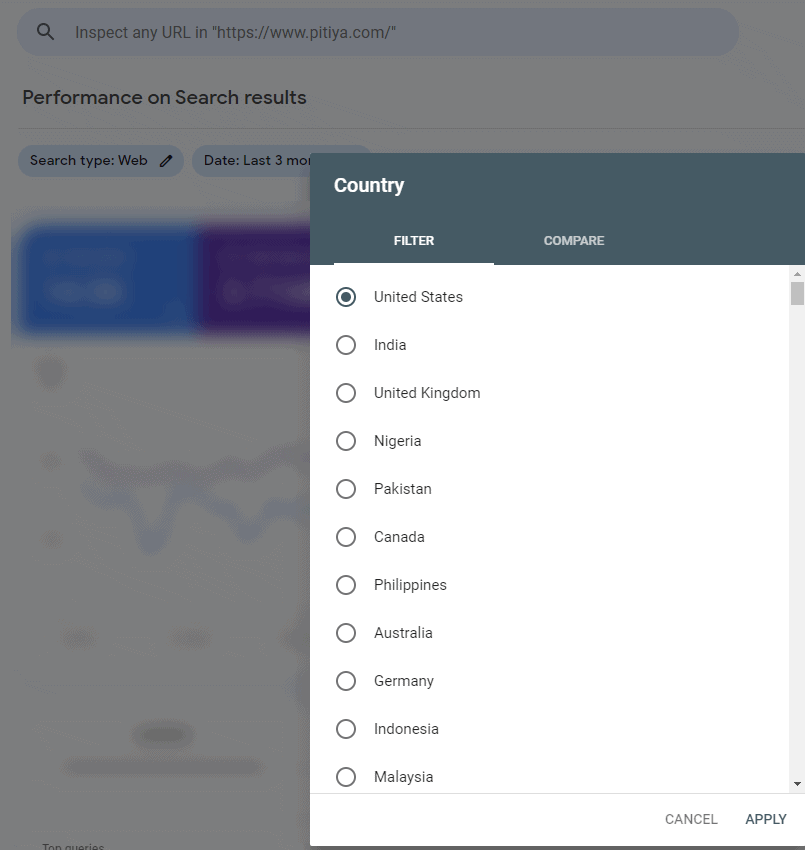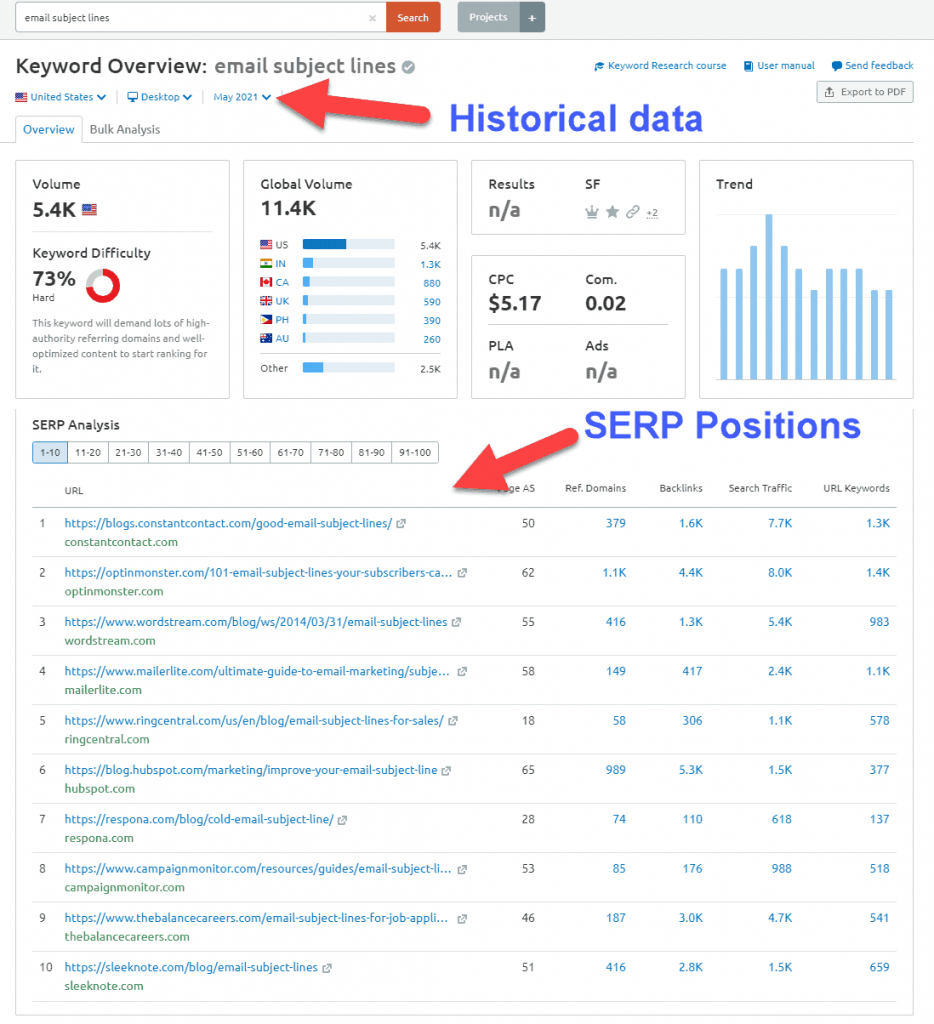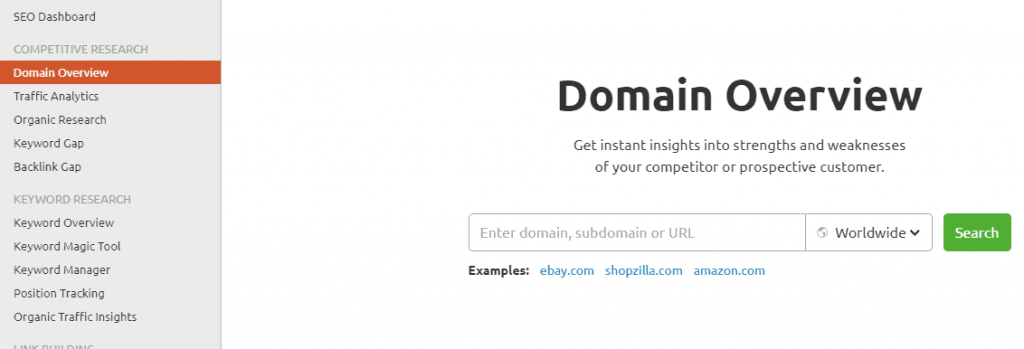In a perfect world, your web pages rank on the first page of Google for every keyword.
However, in reality, that won’t happen whatsoever unless you’re Wikipedia!
Knowing Google keyword rankings for your blog post articles is awesome, right?
After finding keywords ranking on Google, you can tweak many things, such as keyword optimization and content strategies, to increase search engine traffic. So, you can ultimately make more money through your online business.
But how can you check your competitors’ keyword rankings in Google SERPs?
That’s excellent, right?
Yes, if that could be done, you can drastically improve lots of things at once.
What if I say you could actually easily check keyword rankings for the Google search engine? In a few seconds?
Yes, you can check site rankings for every keyword very quickly.
In this article, I will walk you through how to check the Google keyword ranking of any website without struggling.
- What is SEO ranking?
- Google is the dominant search engine
- Find at which positions your site ranks on Google search engines
- Check Keyword Rankings for Blog Posts
- Monitor Google keyword ranking fluctuations
- Identify Competitors in Google SERPs
- Competitor Keyword Analysis
- Find New Opportunities
- Find Keyword Difficulties
- Find traffic distribution per each keyword in Google SERP
- Improve Keyword Rankings In Google
- How to Check SEO Keyword Rankings on Google
- Conclusion
What is SEO ranking?
If you’re a website owner, you should already know this. However, if you started your blogging career recently, here is what SEO ranking is…
After Google (or Googlebot a.k.a web spider for Google search engine) crawled your web pages, Google put the all-important data such as page titles, images, and text content into their large database. So, whenever someone like you searches something related contextually to your web page, Google shows your web page at someplace on search engine result pages (SERPs). Those ranks are known as SEO rankings. Normally higher SEO ranking means, it gets a higher CTR, so receives more traffic.
The Google rankings purely depended upon more than two hundred factors. In fact, Google’s articles rank bottom of SERPs. So, there are no tricks here.
However, the thing is, if you’re a webmaster, you should know how to check Google keyword rankings. Because nowadays, a website or a blog isn’t just made for fun, at least for most people.
You might have made a blog on WordPress, BlogSpot, Tumblr, Brizy, or any other content management system to make money.
To win the SEO game, you should actively monitor your own keyword rankings and, obviously, your competitors’ websites. This isn’t should a must if you still regard your blog as a business.
You should probably not know your competitors’ SEO and content marketing strategies if you don’t analyze competitors’ keyword rankings.
But, you may ask,
Chamal, why should I care about my website rankings, and why should I find competitors’ keyword rankings?
Here’s Why You should check Google keyword rankings…
Google is the dominant search engine
Unless your target audience is from Chinese-speaking countries, you must pay close attention to Google search engine ranking fluctuations and new updates to the algorithm.
According to StatCounter, Google Owns a whopping 92% search share market worldwide.

As you know, the new trends go with mobile. Here’s how Google dominantly owns 95.21% mobile search share market worldwide.

If you drastically want more search traffic to your blog or website, then don’t look anywhere. Google is your best traffic source.
To get full advantage of Google, you’d monitor the keyword rankings of Google SERPs.
Find at which positions your site ranks on Google search engines
As you know, a few variations of Google web pages exist. Some examples:
- Google.com – United States
- Google.co.uk – United Kingdom
- Google.de – Germany
- Google.cn – China
- Google.in – India
You can find other Google country-specific domains from here.
When your blog ranks on Google search engines, you can find rankings of web pages in Google by logging into your Google search console.
However, there is a BIG disadvantage you might face…
Could you guess what it is?
Yes, you can’t find keyword rankings for specific Google country domains daily.
For example, let’s say John has made an event blog, especially for people in Brazil. He has set up the site, made content, built backlinks, and is looking forward to seeing his blog’s first four-figure visitor count.
He sees traffic coming to the blog continuously for his tremendous work. However, he wants to know what keywords drive traffic to his blog. He signs into the Google search console and checks Google ranking keywords.

But, he couldn’t find the keyword ranking position for an exact date.
If you’re in a situation like John’s and want to know where your website ranks on each Google domain accurately, then you should use a good Google rank checker.
Check Keyword Rankings for Blog Posts
If you’re currently using a generic google keyword checker, then you may see you can not check keyword rankings at the post level in most cases. In fact, some Google keyword-checking tools fail to demonstrate accurate data.
And if you’re willing to know whether certain web pages such as review articles are actually ranking with rich structured data, you should use a good google keywords monitor. Otherwise, you don’t know whether your articles with rich structured data perform better on search engine result pages.

Monitor Google keyword ranking fluctuations
Google updates its search engine algorithm to make the search results better. Because Google knows that if they provide crap content for visitors, people will move to other search engines such as Bing.
So, if you’re a set-and-forget blogger who just needs to write content, believe me, that way doesn’t take you to success.
You should always monitor Google keyword rankings. If possible, we should be tracking keyword rankings also. That is a plus advantage over other mediocre bloggers. (I will post a step-by-step guide sooner for this)
Identify Competitors in Google SERPs
I feel sorry for most bloggers because they really don’t know what they are doing or from whose they are competing…
This is a time when advertisers have to pay $100 per click. Just for a click! So, won’t it be advantageous to make a blog targeting those people?
In fact, these days, many companies, including SaaS companies, make use of content marketing and blogging to drive traffic and acquire more customers.
One SEO strategy you should always use is competitor research (aka reverse engineer or competitive intelligence) and identifying keyword difficulties and the likelihood of ranking top of Google SERP.
Don’t do that if you blindly write and post content on your blog. Concentrate on checking google rankings for your target keywords and do your due diligence to identify whether you can profit from that traffic.
Competitor Keyword Analysis
This characteristic separates blogs that make money from ordinary blogs that don’t make any money.
To do competitor keyword analysis, you should know the keyword rankings of competitor websites.
Unless your competitors are kind enough to provide that data, you can’t complete a good competitor keyword analysis.
From that analysis, you can…
- Identify interest for the keyword over time.
- Find keyword rankings.
- Find search volume based on country.
- Find traffic costs and get an idea of what country converts better for the keyword.
- Find Traffic distribution for each organic ranking position.
- Find whether keyword rank for any SERP feature such as Instant Answer, Local Pack, and News.
- Know how many authoritative backlinks you should build to rank on the first page of Google.
- Find a lot more open and hidden information based on keywords.
Find New Opportunities
A good SERP keyword checker gives you more information about keywords and competition and provides a space to look for new opportunities.
For example, suppose you’ve written an article about “A” topic, and it receives traffic from search engines after checking SEO keyword rankings on SERPs. In that case, you can identify new keywords, more long-tail keywords with high search volume.
You want to optimize your web page for those hidden gems of keywords.
Even if your articles receive significant traffic from search engines, don’t forget to check organic keyword rankings because you could find high-traffic keywords which are low competitive.
Find Keyword Difficulties
In the Google Keyword Planner tool, you can easily find average CPCs for keywords in paid searches. However, those number doesn’t reflect much on organic search results.
In SEO rankings, keyword difficulty demonstrates as the sense of the word, the difficulty to rank on the first spot of the first page of Google SERP for a keyword.
So, apart from spending time analyzing competitors’ backlinks, you can easily understand the likelihood of ranking top of Google by finding SEO keyword difficulties.
You should have a few target keywords of your own or competition to find keyword difficulties. To get those keywords, you should involve in checking SEO keywords.
Find traffic distribution per each keyword in Google SERP
Let’s say you’ve found a great competitor website with a few articles relevant to what you’ve published on your site.
After checking Google keyword rankings, you have found some high-traffic keywords that your competitor’s website ranks top of SERPs.
As they are high-traffic volume keywords, it receives a lot more traffic.
So, you can definitely write a good article by adding more information and making use of good graphics, videos, etc.
After optimizing the article for search engines, your web page might also rank for those keywords and generate more Google traffic to your blog.
Checking competitor keywords’ traffic distribution and using good content strategies are worth rather than writing content without knowing the likelihood of ranking for SEO keywords.
Improve Keyword Rankings In Google
Your website or blog will barely receive traffic if web pages rank bottom of SERPs.
Before you start improving Google keyword ranking, you should check SEO keywords’ rankings and monitor them.
It is an excellent way to start increasing keyword rankings on Google.
Now you know ten more reasons to check Google keyword rankings.
You can easily and instantly find keyword rankings of ANY site on Google using online tools. I’ve seen a few google keyword rank checker & tracker tools. However, I use only one tool daily to check keyword rankings and track ranking changes.
How to Check SEO Keyword Rankings on Google

Semrush would probably be the best search engine marketing tool for bloggers, SEOs, content marketers, and online marketers.
It is a complete SEO tool that provides tons of tools to check keyword rankings, analyze competitors, find new keywords for SEO and track organic keyword rankings.
I have been using SEMRUSH since 2013, and I can surely recommend this tool to you because It has helped grow traffic to my websites.
Here’s how to check keyword rankings on Google SERPs using Semrush.
Step 1: Visit the Semrush website over here and create your account first. Fill out the form and proceed to the next step.

Step 2: Once you’ve created your Semrush FREE Trial account, go to Semrush Dashboard over here.
Now you can check keyword rankings in two different ways.
- Check SEO rankings for a particular keyword you know
- Find Google keywords ranking of websites
Here I will discuss these two ways of checking Google keyword ranking.
Check Google Keyword Ranking for Keywords
Step 1: Log in to your Semrush account and head over to the Keyword Overview section under Semrush Keyword Research. Next, enter your targeted keyword phrase, select the Google keyword database (the United States is selected by default), and click the ‘Analyze’ button.

Now you’d see the keyword analytics report. Make sure Google is selected. If you want to check keyword ranking on another search engine, select it from the list.

Here’s the report for the “email subject lines” keyword phrase.

At the bottom of this page, you can see SERP analysis which shows ranking pages for the particular keyword.

Here are a few changes you can make…
Check Google keyword ranking on previous days
Semrush keyword rank checker allows you to find SERP positions of a keyword in the past.

Here is the Keyword Overview report and the SERP Analysis of a previous period.

Check Google keyword ranking on Mobile search
Device targeting lets you find the exact keyword positions in Google SERP on Mobile or Desktop.

You can only check the rankings of the first 100 results. But, as a blogger and webmaster, you want to analyze the first 20 results because impressions decrease drastically as the SERP position lowers.
Find Website’s Keyword Ranking
One of my favorite options is to check site rankings and scrap keywords. Also, this method allows me to calculate the estimated traffic value of competitors so that I can determine the sales generated.
Step 1: Enter your website URL into the search box if you want to find SEO keywords for your website. Else enter another website’s address to find its organic keywords.

Pro Tip: Use “Historical Data” feature on your Semrush GURU plan to find lost keywords.
See the website’s essential details, such as total ranking keywords, daily traffic volume from the search engine, backlinks, and traffic growth over time.

Scroll down to the bottom until you find organic keywords.
- Top Organic Keywords: Find all keywords which are ordered descending according to the traffic distribution.
- Organic Position Distribution: Find keywords grouped by their ranking positions.
Click “View details” under the Top Organic Keywords to learn more about keyword SEO rankings.
On the following page, you will come to know details like the number of total keywords, organic traffic, and traffic cost. Semrush Traffic cost is based on the clickstream data, search volume, and the SERP position. It shows approximately how much the traffic is worth if paid via Google ads.

As you see;
- CookerySchool.co.uk ranks for more keywords on Google.co.uk than other search engine sites.
- 31.34% of total keywords rank under the Local Pack SERP feature.

Smart Passive Income blog covers a lot about podcasts. And one of the highest traffic-driving keywords is about that topic.

I suggest you check out the Historical Data feature on SEMRUSH to find missed keyword rankings of your competitors.
Pro Tip: Enter web page URLs to the Semrush search box and find top organic keywords for particular pages. Sprinkle those keywords on your articles to get more organic traffic.
Keyword Position Changes
Keyword rankings are changing. Google experiments by changing SERP positions often. Semrush provides all these positions changes details.
Click on the ‘Position Changes’ tab and click on a row to see all the details.
Related: How to use Semrush to grow your blog
Conclusion
Search engine ranking is a very crucial aspect of SEO. Your website’s success might depend upon search engine ranking.
As Google owns more than 95% worldwide search share market, you should pay close attention to Google’s ranking of keywords.
By using an accurate Google rank checker, you can get an edge over the competition to find Google rankings of keywords and monitor daily ranking fluctuations.
I personally use Semrush for checking and tracking keyword rankings on search engines.
So, how do you check site ranking on SERPs, and what is your best Google rank checker?



I love SEMrush and their browser extension SEO Quake. One of Quakes features is trust score and domain score, a quick way to work out if you can compete in Google search results.
Yes, James. The uses for SEOQuake extension is immense especially when analyzing keyword’s competition in Google SERPs. I also like metrics like the number of social shares etc.
Thank you for commenting. 🙂
Hi Chamal,
Great article. We know that keyword ranking is very important to gain more benefit from the posts. I use SEMrush for a long time and should say that it’s a good companion for the bloggers to reach the top.
Thank you very much for your step by step instructions.
Have a nice week ahead.
Take care,
Hi Manoj,
Thank you for your kind words. SEMrush is definitely a must-have SEO tool.
What is the favorite part of it you’ve found?